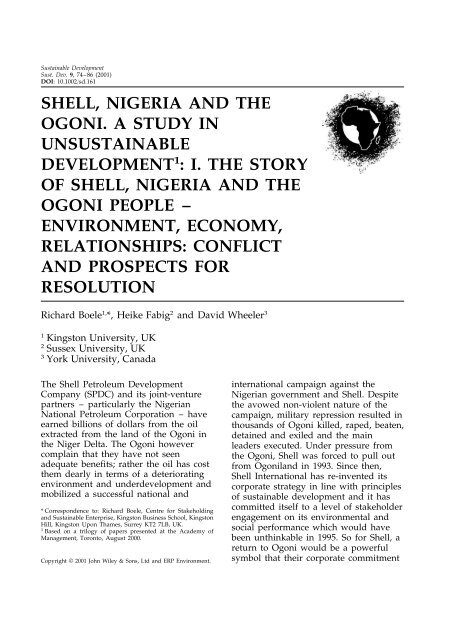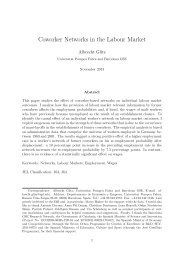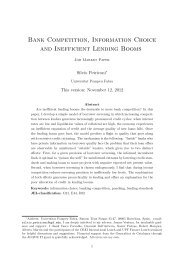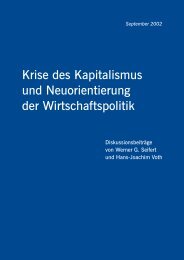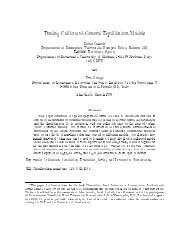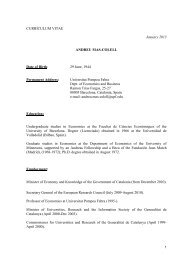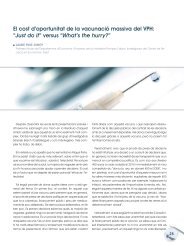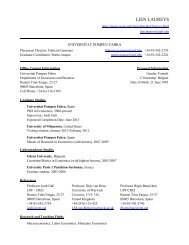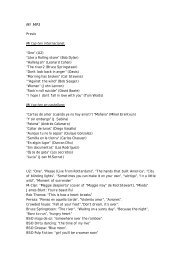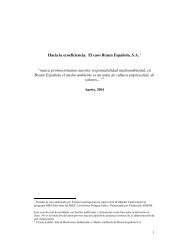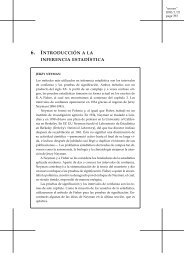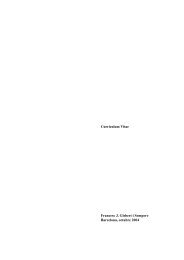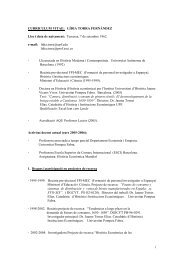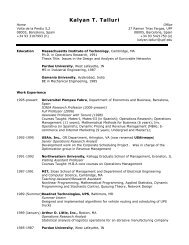SHELL, NIGERIA AND THE OGONI. A STUDY IN UNSUSTAINABLE ...
SHELL, NIGERIA AND THE OGONI. A STUDY IN UNSUSTAINABLE ...
SHELL, NIGERIA AND THE OGONI. A STUDY IN UNSUSTAINABLE ...
Create successful ePaper yourself
Turn your PDF publications into a flip-book with our unique Google optimized e-Paper software.
Sustainable Development<br />
Sust. Dev. 9, 74–86 (2001)<br />
DOI: 10.1002/sd.161<br />
<strong>SHELL</strong>, <strong>NIGERIA</strong> <strong>AND</strong> <strong>THE</strong><br />
<strong>OGONI</strong>. A <strong>STUDY</strong> <strong>IN</strong><br />
UNSUSTA<strong>IN</strong>ABLE<br />
DEVELOPMENT 1 : I. <strong>THE</strong> STORY<br />
OF <strong>SHELL</strong>, <strong>NIGERIA</strong> <strong>AND</strong> <strong>THE</strong><br />
<strong>OGONI</strong> PEOPLE –<br />
ENVIRONMENT, ECONOMY,<br />
RELATIONSHIPS: CONFLICT<br />
<strong>AND</strong> PROSPECTS FOR<br />
RESOLUTION<br />
Richard Boele 1, *, Heike Fabig 2 and David Wheeler 3<br />
1 Kingston University, UK<br />
2 Sussex University, UK<br />
3 York University, Canada<br />
The Shell Petroleum Development<br />
Company (SPDC) and its joint-venture<br />
partners – particularly the Nigerian<br />
National Petroleum Corporation – have<br />
earned billions of dollars from the oil<br />
extracted from the land of the Ogoni in<br />
the Niger Delta. The Ogoni however<br />
complain that they have not seen<br />
adequate benefits; rather the oil has cost<br />
them dearly in terms of a deteriorating<br />
environment and underdevelopment and<br />
mobilized a successful national and<br />
* Correspondence to: Richard Boele, Centre for Stakeholding<br />
and Sustainable Enterprise, Kingston Business School, Kingston<br />
Hill, Kingston Upon Thames, Surrey KT2 7LB, UK.<br />
1 Based on a trilogy of papers presented at the Academy of<br />
Management, Toronto, August 2000.<br />
Copyright © 2001 John Wiley & Sons, Ltd and ERP Environment.<br />
international campaign against the<br />
Nigerian government and Shell. Despite<br />
the avowed non-violent nature of the<br />
campaign, military repression resulted in<br />
thousands of Ogoni killed, raped, beaten,<br />
detained and exiled and the main<br />
leaders executed. Under pressure from<br />
the Ogoni, Shell was forced to pull out<br />
from Ogoniland in 1993. Since then,<br />
Shell International has re-invented its<br />
corporate strategy in line with principles<br />
of sustainable development and it has<br />
committed itself to a level of stakeholder<br />
engagement on its environmental and<br />
social performance which would have<br />
been unthinkable in 1995. So for Shell, a<br />
return to Ogoni would be a powerful<br />
symbol that their corporate commitment
<strong>SHELL</strong>, <strong>NIGERIA</strong> <strong>AND</strong> <strong>THE</strong> <strong>OGONI</strong> I<br />
to being a socially responsible company<br />
is being translated into action on the<br />
ground. However, there is still little trust<br />
between the company and the Ogoni<br />
people and their representative<br />
organization, the Movement for the<br />
Survival of the Ogoni People (MOSOP).<br />
Many of the issues raised by the Ogoni<br />
(such as the need for locally sustainable<br />
development, distribution of oil wealth,<br />
community projects and environmental<br />
issues) have yet to be addressed. This<br />
paper is the first of a trilogy examining<br />
the issues, relationships, management<br />
and strategic implications of the case.<br />
Copyright © 2001 John Wiley & Sons,<br />
Ltd and ERP Environment.<br />
Received 14 November 2000<br />
Revised 23 January 2001<br />
Accepted 13 February 2001<br />
<strong>IN</strong>TRODUCTION<br />
Many of the issues raised by the Ogoni<br />
in their struggle for social and environmental<br />
justice against the Nigerian<br />
government and the oil companies –<br />
such as the need for locally sustainable development,<br />
distribution of oil wealth, community<br />
projects and environmental issues – have yet<br />
to be addressed.<br />
This paper is the first of a trilogy examining<br />
the issues, relationships, management and<br />
strategic implications of the case. In this paper,<br />
we will summarize the chronological<br />
story of the conflict between the Ogoni and<br />
Shell, providing a context for the trilogy’s<br />
other articles.<br />
The second paper places the confrontation<br />
in the context of globalization and the challenge<br />
from the anti-globalization social movement<br />
to contemporary business and business<br />
practices. The case also provides a number of<br />
unique insights for proponents of stakeholder<br />
theory with respect to what more equitable<br />
and sustainable economic development might<br />
look like.<br />
In the third paper we assess the effectiveness<br />
of integrating sustainability into business<br />
strategy and postulate that Shell’s strategic<br />
management approach has the potential to<br />
deliver profound change and full integration<br />
of sustainability in Nigeria and elsewhere.<br />
<strong>SHELL</strong> <strong>IN</strong> <strong>NIGERIA</strong><br />
Shell’s exploration began in Nigeria – which<br />
was then a British colony – in 1937 (SPDC,<br />
1998b). The Company discovered its first<br />
commercial oil field in the Delta in 1956 and<br />
by 1958 the first cargo of oil left Nigeria<br />
(SPDC, 1998a,b).<br />
Today, Shell’s operations in Nigeria account<br />
for 14% of their world-wide crude oil production,<br />
yet account for only about 7% of their<br />
profits. Shell produces half of Nigeria’s total<br />
daily production of 2 million barrels, some of<br />
the best crude oil in the world (Howarth,<br />
1997, p 384). Shell considers their Nigeria<br />
operations to be ‘arguably Shell’s largest and<br />
most complex exploration and production<br />
venture’ outside North America (Shell International,<br />
1995b).<br />
Since the industry’s nationalization in the<br />
1970s, the Nigerian government has operated<br />
joint ventures with foreign oil companies. In<br />
the case of Shell’s operations, the government<br />
owns 55% while Shell Petroleum Development<br />
Corporation (SPDC) – Shell’s Nigerian<br />
subsidiary – owns 30% and Elf and Agip hold<br />
the rest. Shell is the operating partner making<br />
all day-to-day operational decisions<br />
(Howarth, 1997).<br />
Shell has faced many significant challenges<br />
in Nigeria. Rampant corruption, military dictatorships<br />
and the government’s inability to<br />
provide basic development are just a few.<br />
Despite these circumstances the company believes<br />
its ‘most effective contribution to Nigeria<br />
is through the taxes and royalties we pay<br />
[to the federal government]’ (Shell International,<br />
1995a).<br />
Many demands have been made of the<br />
company from the communities and local<br />
government. The company says that they ‘do<br />
not hold the solution to community demands<br />
Copyright © 2001 John Wiley & Sons, Ltd and ERP Environment. Sust. Dev. 9, 74–86 (2001)<br />
75
for more amenities, more development, more<br />
employment and more control over oil revenues.<br />
That is primarily a government responsibility’<br />
(Shell International, 1995d).<br />
<strong>THE</strong> <strong>OGONI</strong> <strong>AND</strong> OIL:<br />
ENVIRONMENTAL, SOCIAL <strong>AND</strong><br />
ECONOMIC ISSUES<br />
The Ogoni people live in Rivers State in the<br />
Niger Delta, in south-eastern Nigeria, in an<br />
area that is about 100 square kilometres in<br />
size. They number around 500000 people who<br />
live in six kingdoms. Linguistic studies suggest<br />
they settled in the area currently known<br />
as Ogoni over 2000 years ago (Kpone-Tonwe,<br />
1987). The Ogoni were – and still are today –<br />
a largely agricultural and fishing society. The<br />
Ogoni claim their land was until the 1960s<br />
known as the ‘breadbasket’ of the region<br />
(Boele, 1995).<br />
The discovery of oil initiated a process that<br />
dramatically affected the Ogoni, the peoples<br />
of the Niger Delta and Nigeria as a whole.<br />
The Niger Delta is one of the world’s largest<br />
wetlands, covering over 20000 square kilometres.<br />
The fragile eco-systems contained within<br />
the area include mangroves, freshwater<br />
swamp forests, lowland rainforests and<br />
coastal barrier islands. It also contains enormous<br />
bio-diversity including unique and rare<br />
species. Most of the six million people living<br />
within the Delta depend on an agricultural<br />
and fishing economy for their survival (Rowell<br />
and Goodal, 1994; Project Underground,<br />
1997).<br />
Oil, and most importantly the revenue it<br />
generated, quickly dominated the Nigerian<br />
economy and thus control over oil resources<br />
was, and still is, a key concern for any Nigerian<br />
government (Ikein, 1990; Khan, 1994). In<br />
order to assure this control, the Nigerian state<br />
gradually strengthened its control over the<br />
land. The British colonial administration had<br />
vested the ownership of all minerals in the<br />
Crown. This policy was intensified by the<br />
post-colonial Nigerian government through a<br />
Land Use Decree, which vested all land in the<br />
State and later the Petroleum Act, giving the<br />
R. BOELE ET AL.<br />
Federal State the power to seize any land<br />
needed for oil exploitation (Detheridge, 1999;<br />
Frynas, 2000). In the late 1970s, the government<br />
further increased its control over the<br />
petroleum industry via two indigenization decrees,<br />
which virtually nationalized the oil industry<br />
and paved the way for establishing the<br />
current joint ventures.<br />
The disenchantment of the Ogoni people<br />
with the oil multinationals had been building<br />
from the early days. As early as 1968 Ken<br />
Saro-Wiwa wrote in his pamphlet The Ogoni<br />
Nationality Today and Tomorrow<br />
We refuse to accept that the only responsibility<br />
which Shell-BP owes our nation is<br />
the spoliation of our lands [...] We shall<br />
appeal to the Federal military government,<br />
or whatever government succeeds it<br />
to continue to show concern for small<br />
nationalities such as ours – especially in<br />
constitution making, that it TAKE<br />
STRONG COGNIZANCE OF OUR DE-<br />
SIRES WITH REGARD TO <strong>THE</strong> COMPA-<br />
NIES PROSPECT<strong>IN</strong>G OR OPERAT<strong>IN</strong>G<br />
ON OUR SOIL (original emphasis, reproduced<br />
in Saro-Wiwa, 1995a).<br />
Shell estimates that ‘[f]rom the start of production<br />
until 1993 when the company suspended<br />
operations in Ogoni land a total of<br />
634 million barrels of oil, valued at US $5.2<br />
billion, were produced from the area of which<br />
79%, went to the Nigerian government in<br />
taxes, royalties and equity take’ (Detheridge<br />
and Noble, 1998).<br />
The distribution of this oil wealth is a major<br />
issue for the Ogoni and other minorities of the<br />
Niger Delta (Saro-Wiwa, 1995a; MOSOP<br />
Canada, 1998c). Like the other oil producing<br />
communities, the Ogoni have never directly<br />
controlled even part of the petroleum revenue.<br />
This has always gone to the federal<br />
government, which has the duty to redistribute<br />
it amongst the country’s states. The<br />
Nigerian constitution originally provided that<br />
50% of the money generated by the oil (proceeds<br />
of royalties and mining rent) would go<br />
to the regions producing the oil. At the height<br />
of the Ogoni–Shell conflict in the early 1990s<br />
the distribution formula stood at 55% for the<br />
Copyright © 2001 John Wiley & Sons, Ltd and ERP Environment. Sust. Dev. 9, 74–86 (2001)<br />
76
<strong>SHELL</strong>, <strong>NIGERIA</strong> <strong>AND</strong> <strong>THE</strong> <strong>OGONI</strong> I<br />
federal government, 32.5% to the state government,<br />
10% to the local government, 1% to<br />
a fund for the amelioration of ecological problems<br />
and finally 1.5% to the Oil and Minerals<br />
Producing Areas Development Commission<br />
(OMPADEC). This body was charged with<br />
channelling funds specifically to oil producing<br />
communities. In 1992 the OMPADEC share<br />
was increased to 3%. More recently the figure<br />
was increased to 13%. Sadly, the funds for the<br />
oil-bearing communities largely evaporated in<br />
corruption before they could trickle down to<br />
the communities (Boele, 1995; Robinson, 1996;<br />
Frynas, 1999, 2000). No real development was<br />
delivered and what projects were realized<br />
were often unsustainable.<br />
Thus the oil communities saw their allocated<br />
and their actual share of the oil revenue<br />
decrease gradually while at the same time,<br />
others – non-oil-producing majority peoples,<br />
the federal government and the oil companies<br />
– grew wealthier. While the oil may have<br />
brought industrialization to the region and<br />
export revenues to the country, the Ogoni<br />
claim their quality of life has not improved,<br />
and they have not ‘developed’ along with the<br />
rest of their country (Saro-Wiwa, 1995a;<br />
MOSOP Canada, 1998c; Hammer, 1996;<br />
Robinson, 1996; Naanen, 1995).<br />
Oil impacted directly upon the lives of the<br />
Ogoni people with both environmental and<br />
social costs. The communities were confronted<br />
first with seismic surveys and building<br />
works, and then with the effects of oil<br />
extraction such as leaks, oil spills and gas<br />
flaring. Apart from the environmental pollution,<br />
the communities saw oil exploration as<br />
aggravating already heavy pressure on land<br />
in one of Africa’s most densely populated<br />
regions. However, Shell argues it only uses<br />
0.3% of the Delta for its operations and does<br />
not believe it has a significant impact on land<br />
pressure (Detheridge, 1999).<br />
The advent of oil, oil workers and oil installations<br />
brought important societal changes<br />
such as oil workers migrating into an area, the<br />
increasing importance of the money economy<br />
and rising food prices. Temporary employment<br />
was particularly destructive. As young<br />
men were relatively highly paid for short<br />
periods of time, their spending habits<br />
changed and they imitated a mainstream culture,<br />
which caused division separating them<br />
from their communities (Frynas, 2000). As the<br />
main farm workers, women reported being<br />
especially hard hit by the environmental and<br />
social consequences of the oil exploration.<br />
They saw their lands appropriated for oil<br />
extraction, and received neither adequate<br />
compensation nor secure jobs in return.<br />
With the oil also came major industrial development.<br />
Ogoni contains two oil refineries,<br />
one petrochemical plant, a fertilizer plant, a<br />
cement factory and a power plant, but the<br />
Ogoni people are frustrated that the factories<br />
do not employ Ogoni people – despite Federal<br />
government regulations – at what they<br />
consider to be a meaningful level.<br />
The Ogoni accused Shell of ‘devastating’<br />
their environment from the start of Shell’s<br />
operations in 1958 (Saro-Wiwa, 1995a;<br />
MOSOP Canada, 1998c). Shell’s response to<br />
the environmental accusations of the Ogoni<br />
was robust:<br />
The company recognises there are environmental<br />
problems associated with its<br />
operations and it is committed to dealing<br />
with them, but these problems do not add<br />
up to anything like devastation (Shell International,<br />
1995c).<br />
In addition to the general accusation of<br />
‘devastating’ the environment, the company<br />
stood accused of specific acts of environmental<br />
irresponsibility. These included operational<br />
oil spills, gas flaring, acid rain, land use<br />
and waste management. The company acknowledges<br />
that there were environmental<br />
impacts but sought to put these into a wider<br />
context of over-population, over-farming, deforestation<br />
and industrialization (Shell International,<br />
1995c).<br />
The Ogoni pointed to out-dated equipment,<br />
which was poorly maintained over the years<br />
and which led to numerous spills (Saro-Wiwa,<br />
1995a; MOSOP Canada, 1998c). Most of the<br />
Ogoni oil infrastructure was built in the 1960s<br />
and 1970s. Referring to the equipment Shell<br />
confirmed that ‘they were acceptable then and<br />
in line with standards of technology then<br />
prevalent, but we would not build them that<br />
way now’ (Shell International, 1995a).<br />
Copyright © 2001 John Wiley & Sons, Ltd and ERP Environment. Sust. Dev. 9, 74–86 (2001)<br />
77
Oil spills are still a major source of conflict<br />
between the communities and the oil companies.<br />
According to Shell statistics the Ogoni<br />
were very active saboteurs with 69% of all<br />
spills in Ogoni between 1989 and 1994<br />
recorded as sabotage (in comparison to 28%<br />
for the rest of the Delta – Shell International,<br />
1995c). The figure has been strongly disputed<br />
by the Ogoni, who point to a lack of logic in<br />
farming people polluting their own land for<br />
inadequate compensation as SPDC maintained<br />
a policy of not paying compensation<br />
where sabotage was believed to be involved.<br />
There is still little independent scientific<br />
evidence concerning the impact of the oil industry<br />
on the Ogoni’s land that could be<br />
accepted by all parties. There were two major<br />
studies into the Delta’s situation – one by the<br />
World Bank and the other by the Shellinitiated<br />
and funded Niger Delta Environmental<br />
Survey. However they do not focus<br />
specifically on Ogoni and do not take social<br />
and cultural effects into consideration (see<br />
World Bank, 1995; Project Underground, 1997;<br />
NDES, 1995).<br />
The claims and counter-claims around the<br />
impact of oil spills are paralleled throughout<br />
the oil companies’ relations with the oil-bearing<br />
communities. Another of these was the<br />
relationship between the oil companies and<br />
the Nigerian military dictatorship.<br />
<strong>THE</strong> ROLE OF <strong>THE</strong> <strong>NIGERIA</strong>N<br />
MILITARY STATE<br />
The co-operation between the oil companies<br />
and the military dictatorship was an issue that<br />
the Ogoni felt strongly about. From their<br />
point of view, two malign forces were<br />
combining to pursue their own interests. Ken<br />
Saro-Wiwa expressed this sentiment in a<br />
statement during his trial:<br />
Since it [Nigerian military dictatorship]<br />
also depended for survival on the<br />
availability of oil money, its violence is<br />
directed at oil-producing areas such as<br />
Ogoni. [. ..] The military dictatorship<br />
holds down oil-producing areas such as<br />
R. BOELE ET AL.<br />
Ogoni by military decrees and the threat<br />
of or actual use of physical violence so<br />
that Shell can wage its ecological war<br />
without hindrance and so produce the oil<br />
and petrodollars as well as the international<br />
and diplomatic support upon which<br />
the military dictatorship depends (Saro-<br />
Wiwa, 1995b).<br />
Obviously, there is always a certain level of<br />
required co-operation between business and<br />
government. However, the Ogoni claim that<br />
the partnership between SPDC and the Nigerian<br />
military government went well beyond a<br />
normal business relationship. Shell stood accused<br />
of seeking and assisting the intervention<br />
of the security forces when confronted<br />
with demonstrations by the communities (Human<br />
Rights Watch/Africa, 1995; Vidal, 1995;<br />
Robinson, 1996; Human Rights Watch, 1999;<br />
Duodu, 1996). Human Rights Watch/Africa<br />
noted that:<br />
Because the abuses set in motion by<br />
Shell’s reliance on military protection in<br />
Ogoniland continue, Shell cannot absolve<br />
itself of responsibility for the acts of the<br />
military. [...]TheNigerian military’s defence<br />
of Shell’s installations had become<br />
so intertwined with its repression of minorities<br />
in the oil-producing areas that<br />
Shell cannot reasonably sever the two<br />
(Human Rights Watch/Africa, 1995).<br />
The Ogoni perceived the partnership as acting<br />
against their interests. The fact that Shell<br />
has invested considerable sums on its community<br />
relations has done little to change this<br />
perception in Ogoni where communities feel<br />
these projects are insufficient, do not address<br />
the real issues and are a source of division<br />
within the communities.<br />
<strong>THE</strong> EMERGENCE OF MOSOP AS A<br />
POLITICAL FORCE<br />
Where there is discontent and frustration in a<br />
community, new social movements may<br />
emerge to bring about fundamental changes<br />
in the existing social order.<br />
Copyright © 2001 John Wiley & Sons, Ltd and ERP Environment. Sust. Dev. 9, 74–86 (2001)<br />
78
<strong>SHELL</strong>, <strong>NIGERIA</strong> <strong>AND</strong> <strong>THE</strong> <strong>OGONI</strong> I<br />
In Ogoni a powerful example of such a<br />
movement emerged to agitate for Ogoni selfdetermination<br />
in order to bring an end to<br />
perceived ‘economic strangulation, environmental<br />
degradation and political marginalisation’<br />
(Saro-Wiwa, 1995a). With the established<br />
Nigerian political system having<br />
largely failed the Ogoni, they believed they<br />
had little choice but to revert to direct social<br />
action. The Ogoni movement decided to<br />
engage in a non-violent struggle drawing<br />
on the language of minority/indigenous<br />
peoples’ rights and social and ecological justice.<br />
In October 1990 they launched the<br />
Ogoni Bill of Rights. In the Bill, the Ogoni<br />
people, while underlining their loyalty to<br />
the Nigerian nation, asserted their right to<br />
self-determination and articulated their demands<br />
for environmental, social and economic<br />
justice (for a full text of the Bill, see<br />
MOSOP Canada, 1998b).<br />
The oil question was very prominent in<br />
the Ogoni Bill of Rights. Seven of its 20<br />
listed points dealt with the exploration of<br />
oil, the distribution of the revenue it generated<br />
and the relative poverty and neglect of<br />
Ogoni in contrast to the money oil resources<br />
generated for the Federation. Their frustration<br />
was illustrated by the following extract<br />
from the Bill, which notes:<br />
[I]n over 30 years of oil mining, the Ogoni<br />
nationality have provided the Nigerian<br />
nation with a total revenue estimated at<br />
over forty billion Naira, thirty billion dollars.<br />
That in return for the above contribution,<br />
the Ogoni people have received<br />
NOTH<strong>IN</strong>G (quoted in Saro-Wiwa, 1995a<br />
– original emphasis).<br />
Shortly after the proclamation of the<br />
Ogoni Bill of Rights, the signatories of the<br />
Bill established the Movement for the Survival<br />
of the Ogoni People (MOSOP), which<br />
soon became the main social movement organization<br />
voicing the demands articulated<br />
in the Bill of Rights (MOSOP Canada,<br />
1998a,b).<br />
In July 1992 Ken Saro-Wiwa, as the<br />
MOSOP spokesperson, presented the first international<br />
speech on the plight of the<br />
Ogoni people to the United Nations Working<br />
Group on Indigenous Populations. This<br />
began the linking of the Ogoni with international<br />
allies in the form of human rights organizations,<br />
minority rights organizations<br />
and indigenous peoples’ support groups<br />
world-wide (for example, Amnesty International,<br />
1994a,b,c,d; Rowell and Goodal, 1994;<br />
Human Rights Watch/Africa, 1995). In January<br />
1993, MOSOP was admitted as a member<br />
to the Unrepresented Nations and<br />
Peoples Organisation (UNPO). UNPO is an<br />
organization of nations and peoples not adequately<br />
represented in international fora<br />
such as the UN. With their UNPO admission<br />
the Ogoni received their first major<br />
global press exposure from outlets such as<br />
CNN and Time Magazine. The international<br />
media were only too happy to carry<br />
MOSOP’s accusations against Shell (see, for<br />
example, O’Sullivan, 1995; Hammer, 1996;<br />
Vidal, 1995).<br />
<strong>SHELL</strong> <strong>AND</strong> <strong>THE</strong> <strong>OGONI</strong> <strong>IN</strong> DIRECT<br />
CONFLICT<br />
In December 1992, MOSOP issued a ‘demand<br />
notice’ to Shell, the Nigerian National<br />
Petroleum Corporation and Chevron, which<br />
gave them 30 days to respond to a list of<br />
demands that included payment of compensation<br />
for past damage and impacts of the<br />
oil activities (Saro-Wiwa, 1995a). Shell and<br />
the others did not respond and as a result<br />
they were declared ‘persona non grata’ by<br />
MOSOP on 4 January 1993, which was declared<br />
Ogoni Day. 300000 people peacefully<br />
marked the United Nations Year of Indigenous<br />
People. There was not a single reported<br />
incident of violence (Boele, 1995).<br />
However, that day, chants of ‘Say no to<br />
Shell!’ were heard at rallies throughout<br />
Ogoni.<br />
Shell had found tensions rising in Ogoni<br />
rising even before this (Boele, 1995) and officially<br />
withdrew all their staff from Ogoni in<br />
January 1993 after a worker was allegedly<br />
beaten (Boele, 1995). The Ogoni denied that<br />
staff were physically hurt but admit that<br />
Shell facilities were closed down.<br />
Copyright © 2001 John Wiley & Sons, Ltd and ERP Environment. Sust. Dev. 9, 74–86 (2001)<br />
79
CONFLICT WITH <strong>THE</strong> MILITARY<br />
AUTHORITIES<br />
In subsequent clashes between the Ogoni<br />
community and Shell, Nigerian soldiers<br />
opened fire on what MOSOP claimed were<br />
villagers peacefully protesting against the destruction<br />
of the fields for the pipeline construction,<br />
and the first Ogoni people were<br />
killed (Ikwunze, 1993; Boele, 1995).<br />
As the international profile of the Ogoni<br />
cause grew, so the domestic pressure on<br />
MOSOP and the Ogoni people increased. Late<br />
1993 saw a series of attacks on Ogoni communities<br />
in both Ogoni and Port Harcourt resulting<br />
in hundreds of deaths (Niboro, 1993).<br />
Newspapers reported the attacks as ‘ethnic<br />
clashes’ with Ogoni neighbours, but the<br />
Ogoni saw the attacks as punishment for their<br />
stand against the Nigerian military government<br />
and Shell.<br />
The government then attempted to broker a<br />
peace treaty that was supposed to stop the<br />
‘ethnic clashes’ between the Ogoni and their<br />
neighbours. Ken Saro-Wiwa and MOSOP, unlike<br />
other Ogoni representatives, refused to<br />
sign as they objected to a paragraph that<br />
called for the ‘immediate resumption of all<br />
full economic and social activities’ (Boele,<br />
1995). They feared it could be interpreted as<br />
justifying Shell’s resumption of operations. Indeed,<br />
later an internal Shell memo emerged,<br />
dated November 1993, which stated that inspection<br />
teams had moved to ‘inspect the<br />
facilities with a view to resuming operations<br />
at the earliest feasible time.’ (quoted by Boele,<br />
1995).<br />
It was another memorandum, this time<br />
from the Nigerian Government, that implied<br />
direct collusion between the oil companies<br />
and the military in 1994. The leaked document<br />
was reported on the front page of the<br />
UK newspaper The Guardian (Vidal, 1995).<br />
The story quoted the secret government<br />
memorandum,<br />
Shell operations still impossible unless<br />
ruthless military operations are undertaken<br />
for smooth economic activities to<br />
commence [. ..] wasting targets cutting<br />
R. BOELE ET AL.<br />
across communities and leadership cadres<br />
especially vocal individuals [...] (quoted<br />
in Boele, 1995).<br />
The memorandum also noted the need for<br />
‘pressure on oil companies for prompt regular<br />
inputs as discussed’ (quoted in Boele 1995),<br />
implying that Shell may be paying the military<br />
authorities for the operations of Major<br />
Okuntimo’s unit (the Internal Security Task<br />
Force) in Ogoni – a unit well known for its<br />
brutality in Ogoni. Shell responded ‘We categorically<br />
deny that we paid money to the<br />
likes of Major Okuntimo’ (Vidal, 1995).<br />
Even while tensions rose from 1993 there<br />
had been numerous attempts to build bridges<br />
between Shell and the Ogoni people. They<br />
were fundamentally flawed by Shell’s difficulty<br />
in recognizing the significance of<br />
MOSOP:<br />
[T]he company’s ability to communicate<br />
with the Ogoni community is very poor.<br />
Since 1990 this failure stems from the company’s<br />
unwillingness to acknowledge the<br />
significance of MOSOP which now represents<br />
the bulk of the Ogoni community. . .<br />
Shell Nigeria has chosen to promote the<br />
existence of conservative Ogoni leaders,<br />
some of whom have benefited greatly<br />
from the company’s operations, instead of<br />
actively engaging MOSOP (Boele, 1995).<br />
<strong>THE</strong> CONFLICT DEEPENS: <strong>THE</strong><br />
EXECUTIONS <strong>AND</strong> <strong>IN</strong>TERNATIONAL<br />
REACTION<br />
The state violence against the Ogoni climaxed<br />
when Ken Saro-Wiwa and eight other Ogoni<br />
activists were arrested and eventually convicted<br />
of the murders of four conservative,<br />
pro-government chiefs, and sentenced to<br />
death. In the closing statement Ken Saro-<br />
Wiwa made it clear whom he held responsible<br />
for the trial:<br />
Shell is here on trial [...] The Company<br />
has ducked this particular trial, but its day<br />
will surely come and the lessons learnt<br />
Copyright © 2001 John Wiley & Sons, Ltd and ERP Environment. Sust. Dev. 9, 74–86 (2001)<br />
80
<strong>SHELL</strong>, <strong>NIGERIA</strong> <strong>AND</strong> <strong>THE</strong> <strong>OGONI</strong> I<br />
here may prove useful to it for there is no<br />
doubt in my mind that the ecological war<br />
the Company has waged in the Delta will<br />
be called to question sooner rather than<br />
later. . . (Saro-Wiwa, 1995b).<br />
The trial, which was conducted by a military<br />
appointed tribunal and included a<br />
serving military officer, was universally<br />
condemned as a sham (Birnbaum, 1995; ICJ,<br />
1996).<br />
Next to the Nigerian dictatorship, Shell was<br />
the main target for international campaigners<br />
so Shell found itself under intense pressure to<br />
intervene. Shell claims it did call for the government<br />
to respect the right to a fair trial and<br />
humane treatment for persons in detention<br />
and, once the conviction was confirmed, the<br />
Chairman of the Group wrote to the Nigeria<br />
military dictator asking for clemency (SPDC,<br />
1998i). Nevertheless, on 10 November 1995,<br />
Ken Saro-Wiwa and eight MOSOP leaders<br />
(now known as the Ogoni Nine) were hanged<br />
by the Nigerian authorities.<br />
After the executions there was worldwide<br />
condemnation of Shell (Wheeler, 1995; O’Sullivan,<br />
1995; Hammer, 1996). Headlines appeared<br />
that painted Shell as callous and a<br />
supporter of dictators. In the months after the<br />
executions of the Ogoni Nine, Shell found its<br />
role in Nigeria the focus of much analysis in<br />
the media. The role of transnational corporations<br />
in countries with dictatorships was debated<br />
in many and diverse publications and<br />
fora. Some in the media suggested that the<br />
furore had gone too far (McElvoy, 1996). In<br />
response to the criticisms, Shell launched a<br />
communications campaign including a series<br />
of full-page advertisements in major newspapers<br />
such as the New York Times. However, far<br />
more typical was commentary that drew the<br />
obvious conclusion that ethical responsibilities<br />
could not be ignored. UK-based Marketing<br />
Week in their cover story on ‘Shell’s sticky<br />
problem’ noted:<br />
. . . the Shell case has wider implications<br />
for other multinationals who could also<br />
face worldwide pressure to accept ethical<br />
and social responsibility for their actions<br />
around the world (O’Sullivan, 1995).<br />
In the year following the executions, Shell<br />
was forced to defend itself again and again –<br />
from the criticisms of members of conservation<br />
groups, academics and learned societies<br />
who wished to sever links with the company<br />
through to local governments considering<br />
boycotts of Shell products.<br />
The Shell Annual General Meetings in May<br />
1996 and 1997 also saw significant and simultaneous<br />
actions in The Netherlands and the<br />
United Kingdom. During the 1997 AGM a<br />
shareholder resolution was tabled requesting<br />
the company to be more transparent in its<br />
social and environmental responsibilities. In a<br />
significant result the resolution was supported<br />
by over 10% of shareholders who<br />
voted even though the directors recommended<br />
voting against the resolution. There<br />
were also actions outside the AGM including<br />
the handing out of an alternative ‘annual report’<br />
entitled Human Rights and Environmental<br />
Operations Information on the Royal Dutch/Shell<br />
Group of Companies (Project Underground,<br />
1997).<br />
RECENT CHANGES<br />
The sudden and unexpected death of General<br />
Abacha, Nigeria’s military ruler, in 1998<br />
brought significant change to Nigeria. The<br />
country returned to civilian rule; the political<br />
climate in the country has freed up significantly,<br />
and a great number of political prisoners,<br />
including the remaining Ogoni activists<br />
arrested with Ken Saro-Wiwa but not yet tried<br />
(known as the Ogoni 20), were released. The<br />
militarization of Ogoni ended and MOSOP<br />
leaders in exile began returning home.<br />
In order to address the outstanding issues<br />
of development, the government initiated the<br />
Niger Delta Development Commission Bill<br />
(NDDC Bill). While full of good intentions,<br />
MOSOP felt the current Bill was ‘vulnerable<br />
to the same political manipulation that has<br />
characterised earlier bodies’ and ‘has exposed<br />
the continuing [...] lack of understanding of<br />
fundamental issues by policy-makers in Abuja<br />
[the Nigerian state capital]’ (MOSOP International<br />
Secretariat, 1999b).<br />
Copyright © 2001 John Wiley & Sons, Ltd and ERP Environment. Sust. Dev. 9, 74–86 (2001)<br />
81
Shell International also underwent a process<br />
of transformation. In 1996, the company<br />
initiated the ‘Society’s changing expectations’<br />
project, an elaborate audit of the views of the<br />
company’s stakeholders (Shell International,<br />
1999a. The project found that:<br />
Shell’s economic contribution to society,<br />
technology leadership, and product quality<br />
are recognised, but on human rights<br />
and environmental care Shell is rated<br />
poorly by both the general public and<br />
opinion leaders (Shell International,<br />
1999a).<br />
Cor Herkstroter, Chairman of the Committee<br />
of Managing Directors admitted Shell was<br />
responsible for ‘technological arrogance’ in<br />
regard to discussion about environment and<br />
human rights (Anonymous, 1996). In the year<br />
after the execution of Ken Saro-Wiwa and his<br />
eight colleagues, Shell engaged in a process of<br />
dialogue with a number of stakeholders,<br />
which promised to be the beginning of a<br />
process of serious evolution and change for<br />
the company. One part of this was Shell’s<br />
regular dialogue with human rights organizations<br />
such as Amnesty International and Pax<br />
Christi.<br />
Subsequently, in 1997, Shell revised its 1976<br />
Statement of General Business Principles. They<br />
‘reaffirm the [. ..]principles that govern how<br />
each of the Shell companies which make up<br />
the Royal Dutch/Shell Group of Companies<br />
conducts its affairs’ and ‘apply to all transactions,<br />
large or small, and describe the behaviour<br />
expected of every employee in every<br />
Shell company in the conduct of its business’<br />
(Shell International, 1997).<br />
The revised Principles were unique at the<br />
time in their explicit reference to ‘express<br />
support for fundamental human rights in line<br />
with the legitimate role of business’ (Shell<br />
International, 1997). They also re-affirmed the<br />
company’s responsibilities to society, and<br />
specifically state that Shell aims to ‘give<br />
proper regard to health, safety and the environment<br />
consistent with their commitment to<br />
contribute to sustainable development’ (Shell<br />
International, 1997).<br />
R. BOELE ET AL.<br />
In 1998, Shell International published its<br />
first corporate statement of social and environmental<br />
performance entitled Profits and<br />
Principles – Does There Have to be a Choice?<br />
(Shell International, 1998). It ‘gives a detailed<br />
assessment [of the company’s] progress in<br />
living up to the values of [the] revised Statement<br />
of General Business Principles’ (Shell International,<br />
1999a). In the report, the company<br />
claims to have been ‘shaken by the tragic<br />
execution of Ken Saro-Wiwa’ (Shell International,<br />
1998). Furthermore, Shell acknowledged<br />
that, while convinced that it ‘acted<br />
honourably’, it realized that ‘the conviction<br />
that you are doing the right things is not the<br />
same as getting them right’ and that was ‘a<br />
very salutary lesson’ (Shell International,<br />
1998). The report states the Brent Spar and<br />
Ken Saro-Wiwa cases were turning points for<br />
the company (Shell International, 1998).<br />
The company also produced a practical<br />
guide to human rights (also known as the<br />
Management Primer on Human Rights), designed<br />
to help the Shell companies ‘to discuss<br />
their roles and responsibilities in understanding<br />
and supporting human rights [...]aspart<br />
of an awareness programme designed to help<br />
staff deal with the issue in their work’ (Shell<br />
International, 1999b). The guide departs from<br />
Shell’s earlier narrow view of the role of business<br />
in society and acknowledges that:<br />
Major human rights violations do not generally<br />
exist in a vacuum, but within a<br />
nexus of corruption, poverty, poor public<br />
services and infrastructure, governmental<br />
instability and other factors which make it<br />
difficult for business to operate (Shell International,<br />
1999c).<br />
As Shell International undertook the strategic<br />
corporate changes outlined above, there<br />
were significant implications for Shell in<br />
Nigeria.<br />
One of the Ogoni’s earliest complaints<br />
against Shell was the flaring of natural gas (a<br />
by-product of oil production) in ground level<br />
pits, some of which are located close to villages.<br />
Environmental activists and the Ogoni<br />
have long argued the gas should be utilized.<br />
Indeed, using the gas can be commercially<br />
Copyright © 2001 John Wiley & Sons, Ltd and ERP Environment. Sust. Dev. 9, 74–86 (2001)<br />
82
<strong>SHELL</strong>, <strong>NIGERIA</strong> <strong>AND</strong> <strong>THE</strong> <strong>OGONI</strong> I<br />
profitable, and harnessing of non-associated<br />
gas has been planned for more than 30<br />
years (Frynas, 2000). Shell has now built an<br />
LNG plant (Shell International, 1999b) and<br />
has a ‘commitment to end gas disposal by<br />
continuous gas flaring by 2008.’ (Shell International,<br />
1999b).<br />
SPDC has also made a commitment to<br />
bury all land flowlines by 2003 (SPDC,<br />
1998a) and has been ‘continually renewing<br />
its production infrastructure. The annual<br />
cost of the upgrade and renewal programme<br />
is around $100 million [. ..] Furthermore,<br />
until the end of the century, at least one<br />
fifth of the company’s budget is committed<br />
to operations to conserve and improve the<br />
environment’ (SPDC, 1998d). In addition,<br />
SPDC states that:<br />
Environmental Impact Assessments (EIAs)<br />
are now carried out before every major<br />
project is undertaken by SPDC. All existing<br />
facilities are undergoing a similar examination<br />
through a programme of<br />
Environmental Evaluation Reports (EERs)<br />
which should be completed by the end of<br />
1999. EIAs and EERs cover the whole of<br />
the environment, from the physical to the<br />
socio-economic and health aspects of communities<br />
(SPDC, 1998d).<br />
With regard to rehabilitation of areas polluted<br />
by oil spills in the past, SPDC asserts<br />
that ‘it is envisaged that ‘‘Past Impacted<br />
Areas’’ will be rehabilitated by the end of<br />
2003’ (SPDC, 1998e). Shell Nigeria says it<br />
aims to discuss with the communities what<br />
their needs are on environmental issues<br />
(Shell International, 1999b).<br />
Another of the Ogoni’s long-running complaints<br />
against Shell has been the underemployment<br />
of Ogoni people. Today SPDC<br />
claims that 95% of its full time staff are<br />
Nigerian (SPDC, 1998a), 43 Ogoni companies<br />
are registered as Shell contractors and ‘85<br />
Ogoni are employed by SPDC out of a total<br />
workforce of about 5,000’ (SPDC, 1998c).<br />
Shell in Nigeria recognizes that its relations<br />
with the community, especially the<br />
Ogoni community, have been strained.<br />
SPDC claims its ‘support for the communities<br />
dates back to the 1950s and has become<br />
increasingly focused on long term goals in<br />
partnership with the communities themselves’<br />
(SPDC, 1998f). SPDC says it spends<br />
more than $20 million each year on community<br />
development in the entire Niger Delta<br />
and even $36 million in 1996, and formed a<br />
new Community Programme Development<br />
Unit in late 1997 (SPDC, 1998a,f).<br />
Shell continues to attempt dialogue with<br />
the Ogoni. As the company states, ‘[m]eetings<br />
and consultations continued during<br />
1998 with a range of Ogoni groups and organizations.<br />
They were facilitated by, among<br />
others, the Christian Association of Nigeria’<br />
(SPDC, 1998g). Shell maintains that ‘[p]rogress<br />
towards reconciliation has been slow<br />
but steady. SPDC has, some time ago, resumed<br />
community development activity in<br />
Ogoni land in the medical, educational and<br />
agricultural fields’ (Shell International,<br />
1999b).<br />
In a unilateral attempt to create a climate<br />
of reconciliation, Shell proposed a Plan for<br />
Action in Ogoniland in May 1996. The plan<br />
outlined a number of steps towards improving<br />
the situation in Ogoni. These included<br />
‘cleaning up all oil spills – whether or not<br />
due to sabotage – that have happened since<br />
the company withdrew staff in 1993, and<br />
make safe all facilities [...] rehabilitate its<br />
past community projects where necessary<br />
and take over their maintenance [...] [and]<br />
investigate further development projects in<br />
the area’ (Shell International, 1996).<br />
Unfortunately, the company failed to inform<br />
MOSOP of this plan before releasing it<br />
to the press, and did not discuss it with<br />
them. For MOSOP, actions like these reinforced<br />
the perceived dismissive attitude of<br />
the SPDC towards the Ogoni. Shell countered<br />
that it repeatedly stated that it has no<br />
intention of restarting production without<br />
the consent of the Ogoni people. Furthermore,<br />
with damage of over $50 million to<br />
their facilities, the chances of restarting significant<br />
production – even were consent to<br />
be given – were considered slim in early<br />
2000, at least in the short to medium term.<br />
Copyright © 2001 John Wiley & Sons, Ltd and ERP Environment. Sust. Dev. 9, 74–86 (2001)<br />
83
MOSOP <strong>AND</strong> <strong>SHELL</strong> <strong>IN</strong> <strong>NIGERIA</strong> –<br />
PROSPECTS FOR RESOLUTION<br />
As Cor Herkstroter, Chairman of the Committee<br />
of Managing Directors, said in the introduction<br />
to the revised 1997 Statement of<br />
General Business Principles, ‘Upholding the<br />
Shell reputation is paramount. We are judged<br />
by how we act’ (Shell International, 1997).<br />
However, despite all the corporate activity<br />
in Shell International, Acting President of<br />
MOSOP Ledum Mitee was still forced to conclude<br />
in November 1998 that:<br />
Shell – the company that [. ..] promised<br />
to balance principles with profit – has not<br />
made a single concession to help bring<br />
about the peace and reconciliation it says<br />
it wants to see. I have a simple question<br />
for the Directors of Shell: when will you<br />
balance principles with practice in Ogoni<br />
(MOSOP International Secretariat, 1998).<br />
Shell Nigeria says it ‘recognises the gap<br />
between its intentions and its current performance’<br />
(SPDC, 1998h). Furthermore, specific<br />
questions will still have to be addressed<br />
promptly in regard to commitments made by<br />
SPDC. With Shell still persona non grata in<br />
Ogoni, it was not clear how Shell would be<br />
able to keep its promises to bury all flowlines,<br />
renew production infrastructure, rehabilitate<br />
oil spills and undertake its program of Environmental<br />
Impact Assessments and Environmental<br />
Evaluation Reports (SPDC, 1998a,d,e).<br />
Furthermore, the way in which community<br />
development money was spent remained a<br />
cause of deep resentment (MOSOP International<br />
Secretariat, 1998, 1999a,b,c). Villagers<br />
accused the company of being parsimonious<br />
at best, incompetent at development work,<br />
neglecting consultation and paternalistic (Vidal,<br />
1999b). The community development<br />
projects supported by Shell were dismissed<br />
by Ledum Mitee, acting president of MOSOP,<br />
as ‘ineffective, unnecessary or just PR for the<br />
company [. ..] They decide what is good for<br />
us. They are just wasting resources. We have<br />
yet to see the impact of all this spending’<br />
(quoted by Vidal, 1999b).<br />
R. BOELE ET AL.<br />
Activists particularly criticized Shell’s<br />
US$16 million advertising campaign (almost<br />
the total annual SPDC budget for community<br />
projects in the Delta), saying that it should<br />
‘spend it’s money cleaning its mess in Nigeria,<br />
not its image’ (Essential Action, 1999). The<br />
Shell PR campaign, however, seems to have<br />
been money well spent; a UK newspaper reported<br />
that a survey of 160 (western) global<br />
opinion leaders found that Shell was thought<br />
to be ‘strong on the environment’, ‘ethical’<br />
and ‘committed to human rights’ (Vidal,<br />
1999a).<br />
What all opinions do seem to have in common,<br />
though, is the feeling that Shell needs to<br />
enter in a serious dialogue with MOSOP<br />
rather than impose projects, however well intended.<br />
MOSOP noted the ‘continuing failure<br />
of Shell and other multinationals to make<br />
substantive changes to their practices in the<br />
Niger Delta’ as one of ‘the current areas of<br />
prime political concern for MOSOP’ (MOSOP<br />
International Secretariat, 1999b).<br />
CONCLUSION<br />
The story of Shell in Nigeria and the Ogoni<br />
provides many salutary lessons for businesses<br />
seeking to operate successfully and ethically<br />
in developing countries. It is a story, except<br />
for the courage and charisma of Ken Saro-<br />
Wiwa, that might never have come to the<br />
attention of environmental and social activists<br />
worldwide. To its credit Shell International<br />
has attempted to internalize some learning<br />
from the events described here – to the extent<br />
that it has altered its business strategy in line<br />
with principles of sustainable development<br />
and its approach to stakeholder dialogue.<br />
Shell has also recognized the need for cultural<br />
change and a more sophisticated attitude to<br />
‘political’ questions of human rights, environmental<br />
responsibility and corporate social<br />
responsibility. The challenge that remains<br />
for Shell International is to translate the new<br />
corporate strategy and attitudes into management<br />
action on the ground in Nigeria.<br />
The implications for management approach<br />
and business strategy of these events are<br />
Copyright © 2001 John Wiley & Sons, Ltd and ERP Environment. Sust. Dev. 9, 74–86 (2001)<br />
84
<strong>SHELL</strong>, <strong>NIGERIA</strong> <strong>AND</strong> <strong>THE</strong> <strong>OGONI</strong> I<br />
discussed in the second and third papers in<br />
this trilogy.<br />
REFERENCES<br />
Amnesty International. 1994a. Ken Saro-Wiwa. Writer<br />
and President of the Movement for the Survival of the<br />
Ogoni People (MOSOP). Urgent Action 24 May.<br />
Amnesty International. 1994b. Nigeria: Military Government<br />
Clampdown on Opposition, AI Index AFR 44/13/94.<br />
11 November.<br />
Amnesty International. 1994c. Nigeria: Security Forces<br />
attack Ogoni Villages, AI Index AFR 44/WU02/94.<br />
Amnesty International. 1994d. Urgent Action: Further Information<br />
on UA 200/94 (AFR 44/03/94. 24 May 1994) –<br />
Prisoner of Conscience/Legal Concern and New Concern.<br />
Health Concern, AI Index AFR 44/07/94.<br />
Anonymous. 1996. Shell erkent ‘arrogantie’ bij milieukwesties.<br />
NRC Handelsblad 12 October.<br />
Birnbaum M. 1995. Nigeria: Fundamental Rights Denied.<br />
Report of the Trial of Ken Saro-Wiwa and Others. Article<br />
19: London.<br />
Boele R. 1995. <strong>OGONI</strong> – Report of the UNPO Mission to<br />
Investigate the Situation of the Ogoni of Nigeria. Unrepresented<br />
Nations and Peoples Organisation (UNPO):<br />
The Hague.<br />
Detheridge A. 1999. Personal Communication.<br />
Detheridge A, Noble P (Shell). 1998. A response to<br />
Frynas. Third World Quarterly 19(3): 457–478.<br />
Duodu C. 1996. Shell admits importing guns for the<br />
Nigerian Police. The Observer 28 January.<br />
Essential Action. 1999. Action Alert: Tell Shell to spend its<br />
money cleaning its mess in Nigeria. not its image! http://<br />
essentialaction.org/shell/PRAlert.html [21 November<br />
1999]<br />
Frynas JG. 1999. Corporate and State Response to Anti-Oil<br />
Protests in the Niger Delta. Paper presented at African<br />
Studies Association Annual Conference, Philadelphia<br />
1999.<br />
Frynas JG. 2000. Oil in Nigeria: Conflict and Litigation<br />
between Oil Companies and Village Communities. LIT:<br />
Muenster.<br />
Hammer J. 1996. Nigeria crude. Harper’s Magazine June.<br />
Howarth S. 1997. A Century in Oil: the ‘Shell Transport<br />
and Trading Company 1897–1997’. Weidenfeld and<br />
Nicolson: London.<br />
Human Rights Watch. 1999. The Price of Oil – Corporate<br />
Responsibility and Human Rights Violations in Nigeria’s<br />
Oil Producing Communities. Human Rights Watch:<br />
New York.<br />
Human Rights Watch/Africa. 1995. Nigeria. The Ogoni<br />
Crisis: a Case Study of Military Repression in South East<br />
Nigeria. Human Rights Watch: Africa.<br />
Ikein AA. 1990. The Impact of Oil on a Developing Country:<br />
the Case of Nigeria. Praeger: New York.<br />
Ikwunze C. 1993. Soldiers attack Ogonis. Daily Satellite<br />
5 May. http://www.mosopcanada.org/text/info/<br />
mosop0224.html [3 December 1999]<br />
International Commission of Jurists (ICJ). 1996. Nigeria<br />
and the Rule of Law: a Study. ICJ: Geneva.<br />
Khan SA. 1994. Nigeria: the Political Economy of Oil.<br />
Oxford Institute for Energy Studies–Oxford University<br />
Press: Oxford.<br />
Kpone-Tonwe S. 1987. The Historical Tradition of Ogoni,<br />
MPhil thesis. University of London School of Oriental<br />
and African Studies.<br />
McElvoy A. 1996. Ethics man. The Spectator 13 January:<br />
9–12.<br />
MOSOP Canada. 1998a. The Story of the Movement of<br />
the Survival of Ogoni People (MOSOP). http://<br />
www.mosopcanada.org/text/story.html [3 December<br />
1999]<br />
MOSOP Canada. 1998b. The Ogoni Bill of Rights. http://<br />
www.mosopcanada.org/text/info/mosop0370.html [3<br />
December 1999]<br />
MOSOP Canada. 1998c. The Role of Shell in Ogoni People<br />
(MOSOP). http://www.mosopcanada.org/text/shell.<br />
html [3 December 1999]<br />
MOSOP International Secretariat (mosop@gn.apc.org).<br />
1998. Press release – 3rd anniversary of the murder of<br />
Ken Saro-Wiwa and 8 others: MOSOP tells Shell:<br />
‘clean up by 2000 or clear out’. <strong>SHELL</strong>-<strong>NIGERIA</strong>-<br />
ACTION Discussion List. http://lists.essential.org/shellnigeria-action<br />
[10 November 1998]<br />
MOSOP International Secretariat (mosop@gn.apc.org).<br />
1999a. Obasanjo urged to on Niger Delta, press release.<br />
30 September 1999. <strong>SHELL</strong>-<strong>NIGERIA</strong>-ACTION<br />
Discussion List. http://lists.essential.org/shell-nigeriaaction<br />
[4 October 1999]<br />
MOSOP International Secretariat (mosop@gn.apc.org).<br />
1999b. Update. Addresses and Developments, 9 August<br />
1990, email to selected recipients including Heike<br />
Fabig (h.fabig@sussex.ac.uk)<br />
MOSOP International Secretariat (mosop@gn.apc.org).<br />
1999c. Communique issued at the end one-day<br />
MOSOP workshop on Shell Community Development<br />
Projects in Ogoni, Bori, 1999. <strong>SHELL</strong>-<strong>NIGERIA</strong>-<br />
ACTION Discussion List. http://lists.essential.org/shellnigeria-action<br />
[22 October 1999]<br />
Naanen B. 1995. Oil producing minorities and the restructuring<br />
of Nigerian federalism: the case of the<br />
Ogoni people. Journal of Commonwealth and Comparative<br />
Politics 33(1): 45–78.<br />
Niboro I. 1993. Death on sea of oil. The African Guardian<br />
4 October. http://www.mosopcanada.org/text/info/<br />
mosop0245.html [3 December 1999]<br />
Niger Delta Environmental Survey (NDES). 1995. The<br />
Niger Delta Environmental Survey. Background and Mission,<br />
Briefing Note 1. Niger Delta Environmental Survey<br />
Steering Committee: Lagos.<br />
O’Sullivan T. 1995. Shell needs more than slick solution.<br />
Marketing Week 24 November: 22–23.<br />
Project Underground. 1997. Human Rights and Environmental<br />
Operations Information on the Royal Dutch/Shell<br />
Group of Companies 1996–1997, Independent Annual<br />
Report (written by Stephen Kretzman, Project Underground,<br />
and Shannon Wright, Rainforest Action Network).<br />
Project Underground: Berkeley.<br />
Copyright © 2001 John Wiley & Sons, Ltd and ERP Environment. Sust. Dev. 9, 74–86 (2001)<br />
85
Robinson D. 1996. Ogoni. The Struggle Continues. World<br />
Council of Churches: Geneva.<br />
Rowell A, Goodal A (eds). 1994. Shell-Shocked. The environmental<br />
and social costs of living with Shell in Nigeria.<br />
Greenpeace International: Amsterdam.<br />
Saro-Wiwa K. 1995a. A Month and a Day – a Detention<br />
Diary. Penguin.<br />
Saro-Wiwa K. 1995b. Statement to the Ogoni Civil Disturbances<br />
Tribunal.<br />
Shell International. 1995a. Nigeria Brief. The Ogoni Issue.<br />
Shell International: London.<br />
Shell International. 1995b. Shell in Nigeria. Shell International:<br />
London.<br />
Shell International. 1995c. Nigeria Brief. The Environment.<br />
Shell International: London.<br />
Shell International. 1995d. Nigeria Brief. Community Development.<br />
Shell International: London.<br />
Shell International. 1996. Shell Nigeria Offers Plan for<br />
Ogoni, News Release, 8 May. Shell International Media<br />
Relations.<br />
Shell International. 1997. Statement of General Business<br />
Principles. Royal Dutch/Shell Group of Companies (revised<br />
edition, first edition published in 1976). Shell<br />
International: London.<br />
Shell International. 1998. Profits and Principles – Does<br />
There Have to be a Choice? The Shell Report 1998 (written<br />
by Peter Knight). Shell International: London.<br />
Shell International. 1999a. Listening and Responding –<br />
Dialogue with our Stakeholders. Shell International:<br />
London.<br />
Shell International. 1999b. People. Planet and Profits. An<br />
Act of Commitment. The Shell Report 1999 (written by<br />
Peter Knight). Shell International: London.<br />
Shell International. 1999c. Management Primer on Human<br />
Rights. http://www.shell.com/download/3359/index.<br />
html [21 November 1999]<br />
SPDC (Shell Nigeria). 1998a. SPDC: Factfile. http://<br />
www.shellnigeria.com/frame.asp?Page=factfile [16<br />
November 1999]<br />
SPDC (Shell Nigeria). 1998b. Operations. http://<br />
www.shellnigeria.com/frame.asp?Page=Operations<br />
[15 November 1999]<br />
SPDC (Shell Nigeria). 1998c. Information Resource – The<br />
Ogoni and the Niger Delta. http://www.shellnigeria.<br />
com/frame.asp?Page=Niger [16 November 1999]<br />
SPDC (Shell Nigeria). 1998d. The Environment. http://<br />
www.shellnigeria.com/frame.asp?Page=environment<br />
[15 November 1999]<br />
SPDC (Shell Nigeria). 1998e. Rehabilitation. http://<br />
R. BOELE ET AL.<br />
www.shellnigeria.com/frame.asp?Page=Rehab [22<br />
November 1999]<br />
SPDC (Shell Nigeria). 1998f. The Community. http://<br />
www.shellnigeria.com/frame.asp?Page=community<br />
[16 November 1999]<br />
SPDC (Shell Nigeria). 1998g. Information Resource – Annual<br />
Report 1998. Community Report. http://<br />
www.shellnigeria.com/frame.asp?Page=Comrelations<br />
[16 November 1999]<br />
SPDC (Shell Nigeria). 1998h. Information Resource – the<br />
Environment. http://www.shellnigeria.com/frame.asp?<br />
Page=EnvironmentIssue [22 November 1999]<br />
SPDC (Shell Nigeria). 1998i. Human Rights. http://<br />
www.shellnigeria.com/frame.asp?Page=hr [15 November<br />
1999]<br />
Vidal J. 1995. Nigerian troops ‘killed and tortured’ tribe<br />
which opposed Shell operation. The Guardian 14 January.<br />
Vidal J. 1999a. Eco soundings. The Guardian, Society<br />
Section 3 November.<br />
Vidal J. 1999b. Oil wealth buys health in country within<br />
a country. The Guardian 16 September.<br />
Wheeler D. 1995. Blood on British business hands. New<br />
Statesman and Society 17 November: 14–15.<br />
World Bank. 1995. Defining an Environmental Development<br />
Strategy for the Niger Delta, Confidential Report<br />
14266-UNI. Africa Region West Central Africa Department<br />
Industry and Energy Operations.<br />
BIOGRAPHY<br />
Richard Boele is Industrial Fellow at the Centre<br />
for Stakeholding and Sustainable Enterprise,<br />
Kingston Business School, Kingston<br />
University, UK.<br />
Tel.: +44 0208 5477353; fax: +44 0208<br />
5477024; E-mail: rboele.csse@kingston.ac.uk<br />
Heike Fabig is at the Graduate Research Centre<br />
for the Comparative Study of Culture,<br />
Development and Environment, Sussex University,<br />
UK.<br />
David Wheeler is Director of the Erivan K.<br />
Haub Program in Business and Sustainability,<br />
Schulich School of Business, York University,<br />
Canada.<br />
Copyright © 2001 John Wiley & Sons, Ltd and ERP Environment. Sust. Dev. 9, 74–86 (2001)<br />
86


